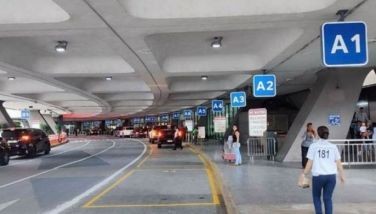Processors eye court order to stop new meat import rules
June 21, 2004 | 12:00am
Meat importers and meat processing companies are preparing to seek legal action to thwart proposed revisions under Administrative Order (AO 39) of the Department of Agriculture (DA) which seeks to impose more stringent rules for meat importation.
Industry sources said the Philippine Association of Meat Processors Inc. (PAMPI) and the Agriculture and Food Suppliers Association (AFSA) are already contemplating filing a temporary restraining order (TRO) should the DA-led Task Force AO 39 headed by Agriculture Undersecretary Arthur Yap issue an unfavorable ruling.
The task force was supposed to have conducted the final public hearing on AO 39 Friday last week but this was postponed to June 22 or Tuesday this week. Several public consultations were previously held to hear all the arguments of conflicting parties, particularly the local hog producers, meat importers/traders like AFSA, PAMPI and trade representatives of foreign embassies in Manila.
The bone of contention is requiring importers to acquire a veterinary quarantine clearance (VQC) which they insist is being used to restrict international trade of meat and meat products.
The VQC is a document issued by the Bureau of Animal Industry granting a permit to import meat and meat products. AO 39’s predecessor is AO 18 and under these AOs, covered products cannot be imported without first securing the VQC.
Before AO 39 was issued, the VQC was routinely issued to importers to authorize the release of covered imported goods from the piers prior to payment of corresponding duties and taxes to the Bureau of Customs. The VQC was issued regardless of transport status of the shipment – before loading, in transit or arrived at port of destination.
However, the revised AO 39 requires the issuance of VQCs at the port of origin, which importers, including exporting countries, said constitutes unfair trade restriction. They said this is inconsistent with the World Trade Organization (WTO) agreement on import licensing procedures as well as the application of sanitary and phytosanitary (SPS) measures.
"It is likely that the affected parties will file a petition for declaratory relief with the appropriate Regional Trial Court. The said petition can be filed by any person whose rights are affected by a stature, executive order, ordinance or any governmental regulation before a breach or violation," said an industry representative.
A legal counsel for PAMPI said the Philippine government, through the DA, could be cited for violation of international trade rules.
"In the case of AO 39, the provision on veterinary quarantine clearance (VQC) seems to violate the WTO agreement on the application of SPS measures," said the legal counsel, noting that WTO rules is specific that members should ensure that their SPS measures do not arbitrarily or justifiably discriminate members where identical or similar conditions prevail.
WTO added that SPS measures should not be applied in a manner which constitutes a disguised restriction on international trade.
PAMPI’s legal counsel said that VQC takes the nature of an import permit, "a non-tariff barrier, and is not sanctioned by international agreements on the application of SPS measures."
"The VQC is no longer a sanitary clearance as required by the WTO, Thus, one AO 39’s guidelines and rules and regulations on the importation of meat and meat products is revised and is already in effect, the stakeholders may bring an action with the regular courts to question the validity of the revised AO 39."
Countries like the US and Spain, were the first to object to the proposed revision of AO 39.
"The measure is harsh, impractical and unrealistic," said Jose Miguel Cortes, economic and commercial counselor of the Spanish embassy in Manila in a letter to Yap.
Cortes warned of unnecessary strains on the diplomatic relations between the two countries if the DA insists on requiring both meat importers and exporters to secure a VQC before they are allowed to transport meat into the Philippines.
Cortes pointed out that any unnecessary regulations which are not in conflict with the WTO SPS measures are considered by Spain as superfluous and redundant.
"We may even be lead to believe that some of these measures are virtual non-tariff barriers. You may likewise note that some proposed measures question or disregard the validity and competence of our own government’s internationally accepted veterinary clearances as well as the veterinary inspection procedures of the Spanish Ministry of Agriculture which is currently recognized throughout the entire European Union as well as in other WTO member-countries," said Cortes.
Moreover, Cortes said that Spain cannot base the issuance of an import veterinary clearance on the requirements set by the VQCs issued by the DA.
"These are matters that should be agreed between the Philippine delegation to the European Commission in Brussels and the European Commission," said Cortes.
Industry sources said the Philippine Association of Meat Processors Inc. (PAMPI) and the Agriculture and Food Suppliers Association (AFSA) are already contemplating filing a temporary restraining order (TRO) should the DA-led Task Force AO 39 headed by Agriculture Undersecretary Arthur Yap issue an unfavorable ruling.
The task force was supposed to have conducted the final public hearing on AO 39 Friday last week but this was postponed to June 22 or Tuesday this week. Several public consultations were previously held to hear all the arguments of conflicting parties, particularly the local hog producers, meat importers/traders like AFSA, PAMPI and trade representatives of foreign embassies in Manila.
The bone of contention is requiring importers to acquire a veterinary quarantine clearance (VQC) which they insist is being used to restrict international trade of meat and meat products.
The VQC is a document issued by the Bureau of Animal Industry granting a permit to import meat and meat products. AO 39’s predecessor is AO 18 and under these AOs, covered products cannot be imported without first securing the VQC.
Before AO 39 was issued, the VQC was routinely issued to importers to authorize the release of covered imported goods from the piers prior to payment of corresponding duties and taxes to the Bureau of Customs. The VQC was issued regardless of transport status of the shipment – before loading, in transit or arrived at port of destination.
However, the revised AO 39 requires the issuance of VQCs at the port of origin, which importers, including exporting countries, said constitutes unfair trade restriction. They said this is inconsistent with the World Trade Organization (WTO) agreement on import licensing procedures as well as the application of sanitary and phytosanitary (SPS) measures.
"It is likely that the affected parties will file a petition for declaratory relief with the appropriate Regional Trial Court. The said petition can be filed by any person whose rights are affected by a stature, executive order, ordinance or any governmental regulation before a breach or violation," said an industry representative.
A legal counsel for PAMPI said the Philippine government, through the DA, could be cited for violation of international trade rules.
"In the case of AO 39, the provision on veterinary quarantine clearance (VQC) seems to violate the WTO agreement on the application of SPS measures," said the legal counsel, noting that WTO rules is specific that members should ensure that their SPS measures do not arbitrarily or justifiably discriminate members where identical or similar conditions prevail.
WTO added that SPS measures should not be applied in a manner which constitutes a disguised restriction on international trade.
PAMPI’s legal counsel said that VQC takes the nature of an import permit, "a non-tariff barrier, and is not sanctioned by international agreements on the application of SPS measures."
"The VQC is no longer a sanitary clearance as required by the WTO, Thus, one AO 39’s guidelines and rules and regulations on the importation of meat and meat products is revised and is already in effect, the stakeholders may bring an action with the regular courts to question the validity of the revised AO 39."
Countries like the US and Spain, were the first to object to the proposed revision of AO 39.
"The measure is harsh, impractical and unrealistic," said Jose Miguel Cortes, economic and commercial counselor of the Spanish embassy in Manila in a letter to Yap.
Cortes warned of unnecessary strains on the diplomatic relations between the two countries if the DA insists on requiring both meat importers and exporters to secure a VQC before they are allowed to transport meat into the Philippines.
Cortes pointed out that any unnecessary regulations which are not in conflict with the WTO SPS measures are considered by Spain as superfluous and redundant.
"We may even be lead to believe that some of these measures are virtual non-tariff barriers. You may likewise note that some proposed measures question or disregard the validity and competence of our own government’s internationally accepted veterinary clearances as well as the veterinary inspection procedures of the Spanish Ministry of Agriculture which is currently recognized throughout the entire European Union as well as in other WTO member-countries," said Cortes.
Moreover, Cortes said that Spain cannot base the issuance of an import veterinary clearance on the requirements set by the VQCs issued by the DA.
"These are matters that should be agreed between the Philippine delegation to the European Commission in Brussels and the European Commission," said Cortes.
BrandSpace Articles
<
>
- Latest
- Trending
Trending
Latest






























